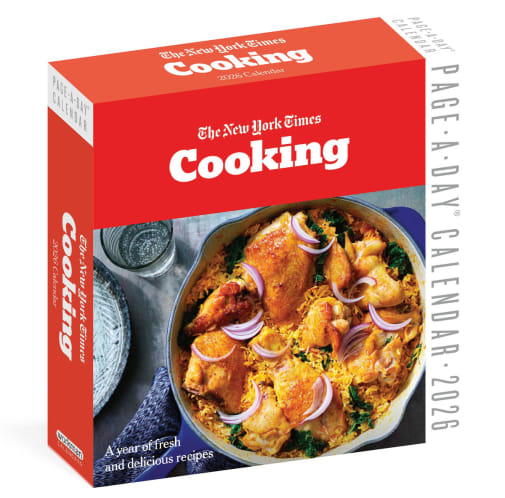You don’t have to be a New Yorker to appreciate a recipe a day! That’s a total of 365 recipes, making this a great gift to someone who would appreciate a cookbook – but it’s also a calendar! The front side shows a color photo and a story about the dish. The actual recipe is on the back of each page. This is a fun one! Now, what’s for dinner? ~Sara
New York Times Cooking Page-A-Day 2026 Calendar
SKU
041983
ISBN
9781523530526
Grade PK-AD
These icons are designed to help you quickly understand and learn important information about our products.
Teaching Method
Traditional
Teacher-centered curriculum commonly used in classrooms that may include a text, teacher manual, tests, etc.
Charlotte Mason
A methodology based on the work of a 19th century educator who maintained that children learn best from literature (Living Books), not textbooks.
Classical
A methodology based on the Latin Trivium (three stages of learning), including the grammar stage (memorization and facts), logic stage (critical thinking), and rhetoric stage (developing/defending ideas).
Unit Study
A thematic or topical approach centered around one topic that integrates multiple subject areas.
Montessori (Discovery)
A methodology based on the work of a 20th century educator that emphasizes student and sensory-driven discovery learning and real-life applications.
Other
Other methodologies
Religious Content
Secular
Contains content contrary to common Christian beliefs (i.e. evolution).
Neutral
Avoids religious or theoretical topics or presents multiple viewpoints without preference.
Christian/Religious
Faith-based or including instructional religious content.
Learning Modality
Auditory
Learns through listening, talking out loud or reading out loud.
Visual
Learns through seeing, prefers written instructions and visual materials.
Kinesthetic/Tactile (Hands-On)
Learns through moving, doing and touching.
Multi-Sensory
Curriculum that employ a variety of activities/components.
Presentation
Sequential
Curriculum progresses through well-defined learning objectives. Emphasizes mastery before moving to the next topic.
Spiral
Topics and concepts are repeated from level to level, adding more depth at each pass and connecting with review.
Conceptual/Topical
Focus is on the “why,” often with a unifying concept as well as specific skills; coverage may be broader.
Teacher Involvement
Low Teacher Involvement
Student-led materials; parent acts as a facilitator.
Medium Teacher Involvement
A mix of teacher-led time and independent student work.
High Teacher Involvement
Teacher-led lessons; may utilize discussions, hands-on activities and working together.
Additional Materials Required
No other materials needed
Everything you need is included.
Other Materials Required
There are additional required resources that are a separate purchase.
Other Materials Optional
There are additional resources mentioned or recommended but are not absolutely necessary.
Consumable
Consumable
Designed to be written in; not reusable.
Non-Consumable
Not designed to be written in; reusable.
Our Price
$17.99 $17.99 $12.95
Rainbow Savings: $5.04
Description
Publisher's Description of New York Times Cooking Page-A-Day 2026 Calendar
A year of recipes from New York Times Cooking.
It’s the best of the best: the tastiest recipes from the most authoritative source, delivered daily. Curated by New York Times Cooking’s expert editors and authors, including Sam Sifton, David Tanis, Melissa Clark, Yotem Ottolenghi, Millie Peartree, and more, this calendar answers the age-old question—what’s for dinner? For a winter Sunday, there’s a hearty Dijon and Cognac Beef Stew. Luscious Maple-Baked Salmon for a quick but elegant weekday dinner, perfect for guests or when you want something a little more special. A bursting-with-flavor Almond Cake with Saffron and Honey, and hundreds more recipes for unforgettable meals, snacks, and desserts. Each recipe includes approximate time from start to finish, number of portions, and easy-to-follow instructions. It’s the perfect gift for anyone seeking inspiration in the kitchen. Printed on responsibly sourced paper and 100% recyclable.
It’s the best of the best: the tastiest recipes from the most authoritative source, delivered daily. Curated by New York Times Cooking’s expert editors and authors, including Sam Sifton, David Tanis, Melissa Clark, Yotem Ottolenghi, Millie Peartree, and more, this calendar answers the age-old question—what’s for dinner? For a winter Sunday, there’s a hearty Dijon and Cognac Beef Stew. Luscious Maple-Baked Salmon for a quick but elegant weekday dinner, perfect for guests or when you want something a little more special. A bursting-with-flavor Almond Cake with Saffron and Honey, and hundreds more recipes for unforgettable meals, snacks, and desserts. Each recipe includes approximate time from start to finish, number of portions, and easy-to-follow instructions. It’s the perfect gift for anyone seeking inspiration in the kitchen. Printed on responsibly sourced paper and 100% recyclable.
Category Description for Informational and Educational Desk Calendars
What can you learn in less than a minute each day? How about the origin of a word, or how to punctuate like a pro? Maybe you could be astounded by a historical tidbit or enjoy the beauty of an art masterpiece. The choice is yours - enrich your odd minutes with a desk calendar that has a whole year of educational value! These calendars typically feature a thick pad of tear-off dated sheets on a plastic stand. They range in size from approximately 5" x 4" to 7.75" X 6." Calendars are for the upcoming year.
Details
| Product Format: | Other |
|---|---|
| Grades: | PK-AD |
| Brand: | Workman Publishing Company |
| ISBN: | 9781523530526 |
| Length in Inches: | 5.5 |
| Width in Inches: | 5.5 |
| Height in Inches: | 1.25 |
| Weight in Pounds: | 1.25 |
Videos
Reviews

